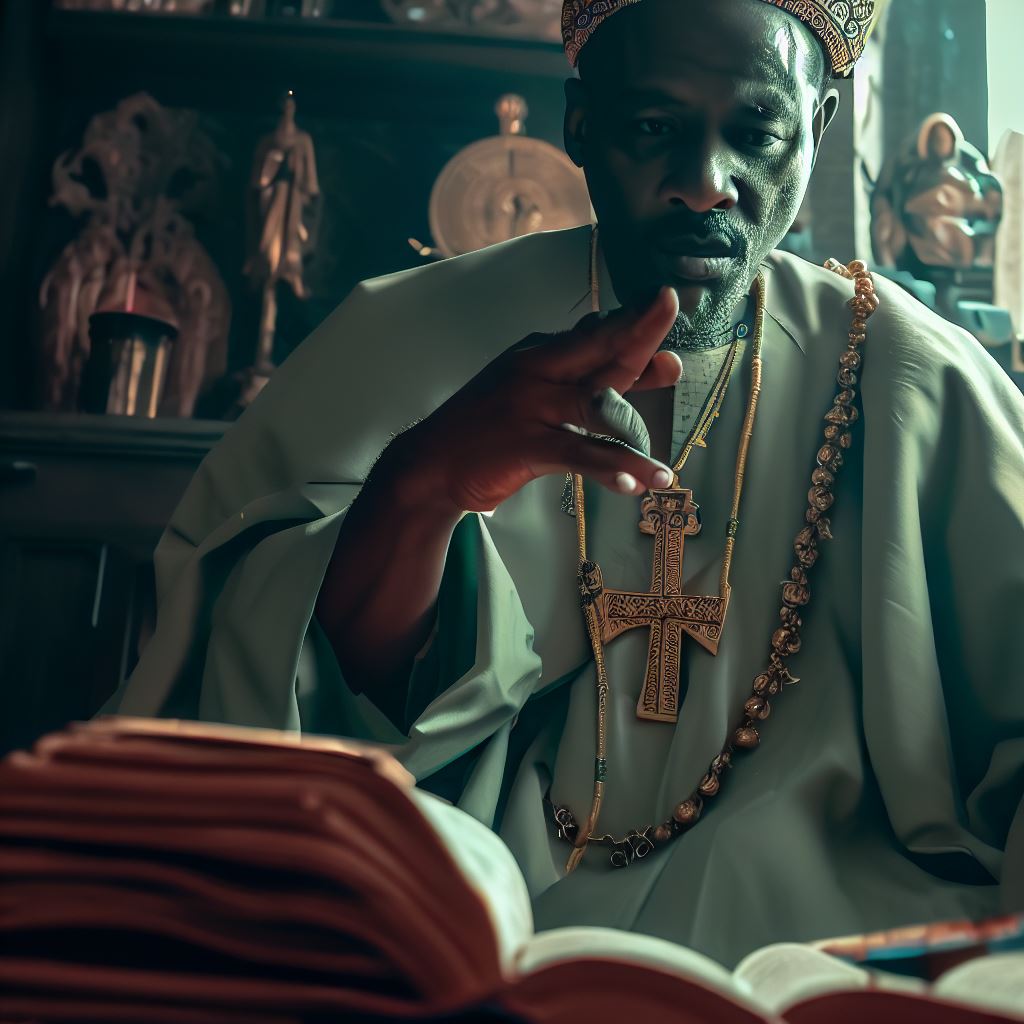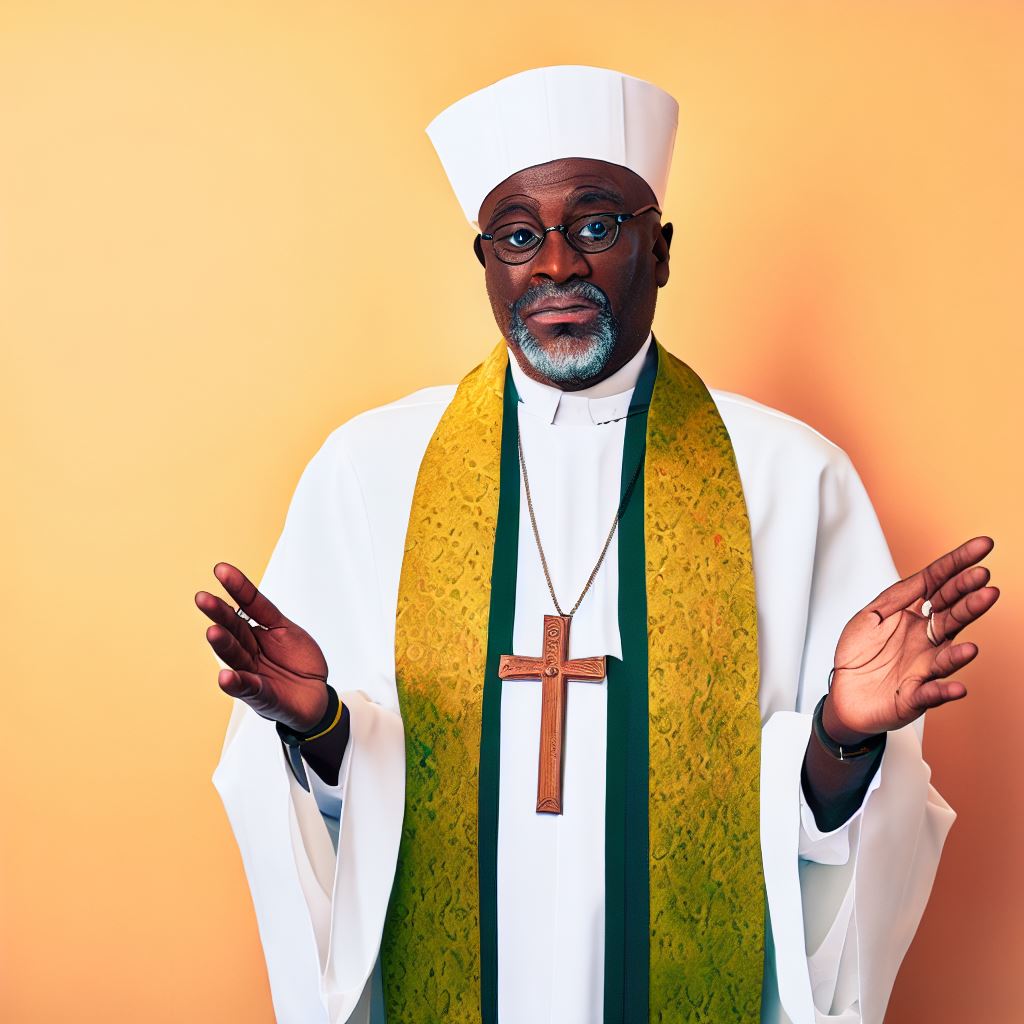Introduction
In this blog post, we aim to provide a vivid account of the daily life of a Nigerian priest.
It is crucial to share real-life experiences to foster understanding and appreciation for different cultures and professions.
Today, we delve into the remarkable routine and responsibilities of a Nigerian priest, shedding light on their unique experiences and challenges.
Background of Nigerian Priesthood
The Catholic Church in Nigeria has a rich history dating back to the late 19th century. It was through the efforts of the early Catholic missionaries that the faith was brought to the region.
Today, Nigeria has the largest Catholic population in Africa, with millions of faithful followers spread across the country.
The Catholic Church plays a significant role in Nigerian society. It is not only a place of worship but also a center for community development and social services.
The priests, in particular, have a crucial role to play in the lives of the people.
Role of Priests in Nigerian Society
Nigerian priests are seen as spiritual leaders, offering guidance and counseling to the faithful.
They are responsible for administering the sacraments, conducting religious ceremonies, and leading prayers in both churches and homes.
In addition to their spiritual duties, Nigerian priests are actively involved in community outreach programs.
They work to alleviate poverty, promote education, and provide healthcare services to those in need. These priests are seen as beacons of hope and agents of positive change in their communities.
Challenges Faced by Nigerian Priests
Despite their significant roles, Nigerian priests face numerous challenges in their daily lives. One of the primary challenges is the issue of security.
The country experiences religious tensions and occasional attacks on churches, putting priests at risk.
Moreover, Nigerian priests often have to deal with a demanding workload.
They are responsible for multiple parishes, and their duties include conducting Mass, administering the sacraments, and attending to the spiritual needs of their parishioners.
This can be overwhelming and exhausting.
Financial challenges are also common among Nigerian priests. They often rely on the goodwill and donations of the faithful to support their basic needs.
This can make it difficult for them to carry out their work effectively or improve their living conditions.
Furthermore, Nigerian priests face societal pressures. They are expected to lead exemplary lives, with the community constantly scrutinizing their actions.
This can lead to feelings of isolation and loneliness, as they may find it challenging to balance their personal needs and duties as priests.
In essence, the Catholic Church in Nigeria has a significant presence and impact on society. Nigerian priests play a pivotal role in their communities, serving as spiritual guides and catalysts for positive change.
However, they also face numerous challenges, including security concerns, demanding workloads, financial constraints, and societal pressures.
Despite these challenges, Nigerian priests continue to serve with dedication and commitment, striving to make a difference in the lives of the faithful and society as a whole.
Read: Client Retention Strategies for Beauty Therapists in Nigeria
Morning routine
How a Nigerian priest typically begins their day
The day of a Nigerian priest usually starts with a serene atmosphere, filled with devotion and purpose.
Waking up early, well before the sunrise, is a crucial aspect of their routine. Rising before dawn allows them to engage in personal prayer and meditation, connecting with their spiritual beliefs.
These early hours allow the priest to center themselves, seek guidance, and find inner strength for the day ahead.
A calm and focused mind is essential before embarking on their sacred duties.
The importance of spiritual preparation before starting their duties
Spiritual preparation is paramount, as it helps the priest align their intentions with their commitment to God. During this time, they reflect on their purpose, seek clarity, and dedicate themselves to their calling.
Immersed in prayer, they ask for guidance, wisdom, and blessings to serve their congregation selflessly.
It is during this personal communion that they forge a deeper connection with their faith.
The priest recognizes the significance of starting their day spiritually grounded, ensuring their actions are driven by divine guidance.
As they finish their prayer, with a soul brimming with peace and conviction, they are prepared for the day’s challenges.
Their morning routine sets the tone for the day, reminding them of their duty to lead and guide others. Once the spiritual preparation is complete, a Nigerian priest then moves on to physical preparations.
Dressing in their clerical attire, symbolic of their vocation, becomes a tangible representation of their divine role.
The act of adorning themselves in the vestments signifies their commitment to representing Christ’s teachings.
As they step out into the world, their attire acts as a visible reminder of their sacred responsibilities. The Nigerian priest comes out of their living quarters, ready to face the day and serve their congregation.
They take a deep breath, allowing themselves a moment to soak in the beauty and serenity of the morning.
With a heart full of gratitude and a purposeful stride, the priest sets off on their path of devotion and service.
Each day, the morning routine remains a constant reminder of their connection to the divine and their mission to lead others.
Read: Continuing Education: Courses for Beauty Therapists in Nigeria
Daily responsibilities
Daily Responsibilities of a Nigerian Priest: A True Account
As the sun rises over the bustling city of Lagos, a Nigerian priest begins his day with a deep sense of purpose.
Guided by faith and dedication, his daily responsibilities are diverse and impactful, making a lasting difference in the lives of those he serves.
Leading Mass and administering sacraments
Every morning, the priest celebrates the Eucharist, leading the congregation in prayer and worship.
With reverence, he administers sacraments such as baptisms, confirmations, weddings, and last rites, nurturing the spiritual growth of his parishioners.
Involvement in community outreach programs and social work
Beyond the walls of the church, the priest actively engages in community outreach programs, addressing the needs of the marginalized.
He organizes food drives, medical camps, and educational initiatives to alleviate poverty and promote social welfare.
By leading by example, the priest inspires his community to bridge the gap between faith and action.
Counseling and guiding the faithful
Throughout the day, the priest offers guidance and counseling to those seeking solace or struggling with personal challenges.
With empathy and compassion, he listens attentively, providing comfort and imparting wisdom rooted in the teachings of the Church.
Conducting religious education and preaching
The priest dedicates significant time to religious education, conducting classes and seminars to deepen the faithful’s understanding of their faith.
Through thought-provoking sermons, he imparts moral values, virtues, and teachings to empower individuals in their daily lives.
Administration and pastoral duties
As an administrator, the priest oversees the day-to-day operations of the parish, managing finances and organizing church activities.
He visits the sick, elderly, and those in need of spiritual support, offering prayers and providing comfort in times of sickness or distress.
Promoting interfaith dialogue and unity
The Nigerian priest recognizes the importance of fostering harmony among different religions.
He actively engages in interfaith dialogue, organizing events that promote peaceful coexistence, fostering unity, and mutual respect.
Continual personal growth and theological study
The priest, committed to lifelong learning, spends time studying and deepening his knowledge of theology and scripture.
This dedication allows him to effectively respond to the questions and spiritual needs of his parishioners, enriching their faith experience.
Creating a sense of community and belonging
A Nigerian priest understands the value of building strong bonds within the parish community.
Through social activities, fellowship gatherings, and parish events, he nurtures a sense of belonging and camaraderie.
In review, the life of a Nigerian priest is filled with a multitude of responsibilities.
From leading Mass and administering sacraments to engaging in community outreach programs, their dedication and unwavering commitment to service are commendable.
Through their active involvement, these priests play a vital role in shaping lives, fostering spiritual growth, and making a positive impact on society.
Read: Marketing Strategies for Real Estate Agents in Nigeria
Challenges faced
Challenges Faced by Nigerian Priests: Overcoming Difficulties to Serve Communities
Nigerian priests dedicate their lives to the service of their communities, facing numerous challenges along the way.
Despite their determination, they encounter difficulties that hinder their work and force them to make sacrifices for the greater good.
Lack of Resources
One of the major challenges faced by Nigerian priests is the lack of resources to effectively carry out their duties.
Many communities lack basic facilities such as electricity, clean water, and proper infrastructure, making it difficult for priests to provide essential services.
Security Concerns
Priests in Nigeria often face security threats due to the prevailing social and political unrest. In some regions, they risk being kidnapped, assaulted, or even killed while serving their communities.
This constant fear hampers their ability to fulfill their spiritual duties.
Societal Pressures
The expectations and pressures of society also pose a challenge to Nigerian priests. Society often expects them to be perfect role models, putting immense pressure on their personal and professional lives.
They must navigate societal expectations while staying true to their calling.
Financial Constraints
Many Nigerian priests struggle with financial difficulties. They often rely on minimal donations from their communities, which are sometimes insufficient to sustain their basic needs.
This financial strain can make it challenging for priests to carry out their duties effectively.
Sacrifices Made by Nigerian Priests
- Leaving Family Behind: Nigerian priests make the sacrifice of leaving their families behind to serve their communities. This separation can be emotionally challenging.
- Abstaining from Personal Relationships: Priests commit to a life of celibacy, renouncing the opportunity for personal romantic relationships or starting a family.
- Embracing Minimalism: Living in impoverished areas, priests willingly embrace a simple and minimalistic lifestyle, focusing their resources on the needs of others.
- Enduring Loneliness and Isolation: Nigerian priests often find themselves working in remote areas without access to modern conveniences, enduring loneliness and isolation.
- Being an Emotional Anchor: Priests serve as emotional anchors for their communities, offering counseling and support in times of crisis. This can be emotionally draining.
- Risking Personal Safety: Despite security concerns, Nigerian priests continue to provide spiritual guidance and support, risking their own personal safety.
Despite the challenges and sacrifices faced by Nigerian priests, their commitment to serving their communities remains unwavering.
They strive to bring hope, faith, and encouragement to those who need it the most.
Read: Top 5 Sommelier Schools in Nigeria for Aspiring Experts

Personal experiences and anecdotes
In this section, we will delve into the personal experiences and stories from Nigerian priests, shedding light on both the joys and trials they face in their vocation.
These real-life examples will make their account more relatable and engaging.
The Joys of a Nigerian Priest
Nigerian priests find immense joy in their commitment to serving God and their communities. Father John, a Nigerian priest, shared a heartwarming story of a young boy he baptized:
- “I remember baptizing a little boy named Daniel. It was a moment filled with pure joy and hope as his parents witnessed the beginning of his journey in faith.”
- “Every time I celebrate mass and see the devotion of my congregation, I am filled with an overwhelming sense of gratitude and fulfillment.”
- “One of the greatest joys I experience as a Nigerian priest is witnessing the transformation of individuals who turn their lives to God and find peace.”
The Trials of a Nigerian Priest
However, the life of a Nigerian priest is not without its challenges. With limited resources and societal pressures, they face various trials that test their faith and commitment.
Father Emmanuel, another Nigerian priest, shared some of his encounters:
- “One of the biggest challenges we face is providing pastoral care in remote areas, where access to basic necessities is scarce.”
- “Many Nigerian priests have experienced persecution due to their faith, navigating through threats and society’s misconceptions.”
- “Financial struggles often make it difficult to support the needs of the parish, hindering our ability to fulfill our duties effectively.”
Triumphs in the Face of Adversity
Despite the trials they face, Nigerian priests continue to strive for greatness in their vocation. Father Samuel, a Nigerian priest working in a disadvantaged community, shared a remarkable story of triumph:
- “In the midst of poverty and despair, we managed to build a community center that provides education and skills training to underprivileged children.”
- “Through the power of faith and determination, we secured partnerships with local businesses to provide sustainable support to the community.”
- “Seeing the smiles on the faces of those we’ve helped uplift gives us the strength to overcome any obstacle.”
Nigerian priests lead extraordinary lives, filled with both immense joy and daunting challenges.
By sharing their personal experiences and stories, we gain a deep appreciation for the sacrifices they make in their unwavering dedication to their vocation.
Let us honor and support these inspiring men who serve as beacons of faith and hope in their communities.
Lunch break and leisure time
How Nigerian priests balance their work and personal time
- Nigerian priests have to find a balance between their work and personal time.
- During their lunch break, priests usually take time to rest and recharge.
- Some priests may engage in leisure activities such as reading or taking a walk.
- Self-care is essential for priests as they take time to relax and rejuvenate.
Their typical lunch break routine and any leisure activities they engage in
- Lunch break also allows priests to connect with fellow clergy members and build relationships.
- It is crucial for priests to have a healthy work-life balance to avoid burnout.
- During lunch breaks, priests may also engage in prayers or spiritual reflections.
- Leisure activities help priests unwind and maintain their mental and emotional well-being.
- Nigerian priests understand the importance of taking care of themselves in order to serve others.
- Having personal time during lunch breaks allows priests to recharge and strengthen their faith.
- Engaging in leisure activities fosters creativity and helps priests maintain a positive mindset.
- Priests may occasionally use their lunch break to catch up on personal errands or appointments.
The importance of self-care and taking time for relaxation
- Self-care is not selfish; it is a necessary part of a priest’s life.
- During leisure time, priests may also engage in hobbies or activities they are passionate about.
- Whether it is reading, listening to music, or spending time in nature, priests prioritize their well-being.
- Taking time for relaxation allows priests to come back to their duties refreshed and reenergized.
- During lunch breaks, some priests may also participate in physical activities like exercise or sports.
- Leisure time allows priests to cultivate their own interests and maintain a sense of individual identity.
- A well-balanced lunch break helps priests maintain a healthy work-life integration.
- Nigerian priests are encouraged to find activities that bring them joy and nourish their souls.
- Personal time during lunch breaks helps priests to maintain a sense of purpose and fulfillment.
Explore Further: Supporting Youth: The Role of Nigeria’s Clergy
Publish Your Professional Profile, Business or Brand
Showcase your expertise, gain trust, and boost visibility instantly on Professions.ng.
Publish NowAfternoon and Evening Routine
Tasks and responsibilities that fill a Nigerian priest’s afternoon and evening
After a busy morning serving the Nigerian community, the afternoon and evening routine of a Nigerian priest is just as demanding. They have a plethora of tasks and responsibilities that fill their schedule.
First and foremost, Nigerian priests dedicate a significant amount of time to parish visits.
They believe in fostering a strong bond with their community members, and visiting parishioners is an essential part of their role.
Whether it’s paying a social call or offering support during difficult times, the priest becomes a familiar face in the lives of the people they serve.
Counseling sessions are also a regular part of a Nigerian priest’s afternoon and evening routine.
People seek their guidance for a variety of reasons, such as relationship issues, spiritual dilemmas, or emotional struggles.
The priest provides a listening ear and offers spiritual advice to help parishioners navigate through their challenges.
In addition to parish visits and counseling, Nigerian priests play a crucial role in providing spiritual guidance.
They lead evening prayer services, conduct Bible studies, and offer teachings on various aspects of the Catholic faith.
This allows them to deepen the spiritual connection within the parish and help individuals grow in their relationship with God.
Additional duties they may have, such as administrative work or meetings
Besides these core tasks, there are other duties that priests may have to handle. Administrative work is one such responsibility.
They must manage the day-to-day operations of the parish, including overseeing finances, coordinating events, and ensuring the smooth functioning of the church facilities.
Attending meetings is another important aspect of a Nigerian priest’s afternoon and evening routine.
They participate in clergy gatherings, where they discuss parish matters, share best practices, and engage in decision-making processes.
These meetings provide an opportunity for priests to collaborate and stay connected with their fellow clergy members.
The day’s responsibilities often extend into the evening, and it is not uncommon for Nigerian priests to be called on for emergencies.
Whether it’s visiting a hospital to administer the sacraments to the sick or attending to a family grieving the loss of a loved one, the priest’s availability and willingness to serve in these moments of need are essential.
Amidst the hectic schedule, Nigerian priests also prioritize personal spiritual nourishment.
They find time for daily prayer, reflection, and their own spiritual development. This ensures that they have the strength and clarity to guide others effectively.
In a nutshell, the afternoon and evening routine of a Nigerian priest is filled with diverse tasks and responsibilities.
From parish visits and counseling sessions to providing spiritual guidance and managing administrative work, their days are diligently spent serving their community.
Despite the demanding nature of their roles, Nigerian priests remain committed to their vocation, striving to make a positive impact on the lives they touch.
Conclusion
The daily life of a Nigerian priest is filled with dedication and selflessness. They commit themselves to serving others and spreading the message of love and hope.
Understanding and appreciating the role of priests in society is crucial as they play a significant part in guiding and nurturing the spiritual well-being of individuals and communities.
By gaining a deeper understanding of different cultures and perspectives, we can broaden our horizons, foster tolerance, and promote a more inclusive society.
Let us strive to respect and embrace the diverse roles and contributions of individuals, such as Nigerian priests, in making the world a better place for all.




